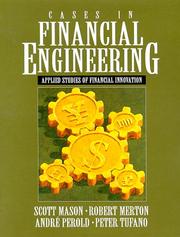| Listing 1 - 6 of 6 |
Sort by
|
Book
Year: 1990 Publisher: Cambridge, Mass. National Bureau of Economic Research
Abstract | Keywords | Export | Availability | Bookmark
 Loading...
Loading...Choose an application
- Reference Manager
- EndNote
- RefWorks (Direct export to RefWorks)

ISBN: 0130794198 Year: 1995 Publisher: Englewood Cliffs, NJ : Prentice-Hall International,
Abstract | Keywords | Export | Availability | Bookmark
 Loading...
Loading...Choose an application
- Reference Manager
- EndNote
- RefWorks (Direct export to RefWorks)
Private finance --- International finance --- 336.76 --- Derivative securities --- Financial engineering --- Securities --- Blue sky laws --- Capitalization (Finance) --- Investment securities --- Portfolio --- Scrip --- Securities law --- Underwriting --- Investments --- Investment banking --- Computational finance --- Engineering, Financial --- Finance --- Derivative financial instruments --- Derivative financial products --- Derivative instruments --- Derivatives (Finance) --- Financial derivatives --- Structured notes (Securities) --- Beurswezen. Geldmarkt. Valutamarkt. Binnenlandse geldmarkt. Valutamarkt --- Law and legislation --- 336.76 Beurswezen. Geldmarkt. Valutamarkt. Binnenlandse geldmarkt. Valutamarkt --- Corporate finance
Book
Year: 1991 Publisher: Cambridge, Mass. National Bureau of Economic Research
Abstract | Keywords | Export | Availability | Bookmark
 Loading...
Loading...Choose an application
- Reference Manager
- EndNote
- RefWorks (Direct export to RefWorks)
Book
Year: 1991 Publisher: Cambridge, Mass. National Bureau of Economic Research
Abstract | Keywords | Export | Availability | Bookmark
 Loading...
Loading...Choose an application
- Reference Manager
- EndNote
- RefWorks (Direct export to RefWorks)
We investigate how shareholder trading practices might be linked to corporate investment horizons. We examine two possible linkages and analyze a range of data relevant to them. The first is excess volatility, which occurs when stock prices react not only to news about economic fundamentals, but also to trades based on non-fundamental factors. Excess volatility could lead to a higher cost of capital, and thereby reduce long-term corporate investment. The second linkage derives from an information ea between management and outside shareholders. In the presence of such a gap, maximizing short-run and long-run stock prices are not the same thing. Management may be able to raise current stock prices by undertaking certain actions that will reduce long-run value. In such a case, management faces the dilemma of which shareholders to please: those who do not plan to hold the stock for the long-run versus those who do. As shareholder horizons shorten, it can become more difficult to focus exclusively on maximizing long-run value. With respect to excess volatility, our basic conclusions are that neither changes in trading practices over time nor differences in trading practices across countries contribute significantly to any underinvestment problem. There is no evidence to indicate that measures to reduce trading volume (such as transactions taxes) would lower stock-price volatility in a way that would stimulate investment. With respect to the information gap hypothesis, we find "circumstantial' evidence consistent with certain preconditions for underinvestment. This is not, however, evidence of underinvestment itself. In addition, many of the forces that can lead to underinvestment -- such as hostile takeovers -- are also related to other, positive aspects of economic performance. Policy responses therefore involve a difficult set of tradeoffs.
Book
Year: 1990 Publisher: Cambridge, Mass. National Bureau of Economic Research
Abstract | Keywords | Export | Availability | Bookmark
 Loading...
Loading...Choose an application
- Reference Manager
- EndNote
- RefWorks (Direct export to RefWorks)
We document a large decrease in autocorrelation and increase in variance of recent short-run returns on several broad stock market indexes, over the 1983-89 period, 15-minute returns went from being highly positively serially correlated to practically uncorrelated. Over the past twenty years, daily and weekly autocorrelations have also fallen, we use transactions data to decompose short-run index autocorrelation into three components: bid-ask bounce, nontrading effects, and noncomtemporaneous cross-stock correlations in specialists' quotes. The first two factors do not explain the autocorrelation's decline. We argue that new trading practices have improved the processing of market-wide information, and that the recent decreases in autocorrelation and increases in volatility simply reflect these improvements.
Book

ISBN: 9781400829408 Year: 2021 Publisher: Princeton, NJ
Abstract | Keywords | Export | Availability | Bookmark
 Loading...
Loading...Choose an application
- Reference Manager
- EndNote
- RefWorks (Direct export to RefWorks)
| Listing 1 - 6 of 6 |
Sort by
|

 Search
Search Feedback
Feedback About UniCat
About UniCat  Help
Help News
News